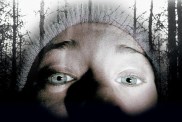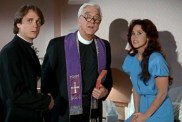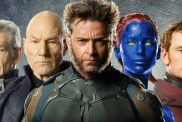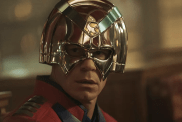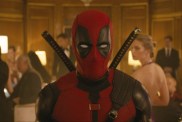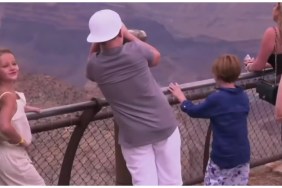If the world was to end in three years as it’s been foretold by the Mayans when they devised their intricate series of calendars and almanacs eons ago, you’d probably want it to see its inevitable demise happen the way that it does in Roland Emmerich’s new movie 2012.
After all, how could one panic when being entertained by some of the most spectacular displays of destruction ever devised by Germany’s answer to Irwin Allen? He’s also become more of an equal opportunity destroyer this time, leaving New York City well enough alone and instead going after places like Yellowstone Park, Vatican City and other famous monuments.
Amidst it all, there’s John Cusack, Chiwetel Ejiofor and others trying to figure out what is happening and whether the end of the world can be prevented, as they make their way to a series of high-tech arks being built in the Himalayas.
ComingSoon.net first had a chance to talk to Emmerich at Comic-Con in a noisy talent green room before he was whisked downstairs to blow many minds in Hall H with footage of Cusack driving a limo through downtown Los Angeles as it’s hit by a series of major earthquakes that literally sends it sliding into the Pacific Ocean.
ComingSoon.net: So “2012”… there’s obviously been the Mayan predictions about the world ending in that year, which has been the subject of many books. What made you decide to make a movie about it?
Roland Emmerich: I always wanted to try and make like a modern retelling of “Noah’s Ark.” When Harald (Kloser, Emmerich’s co-writer and composer) and I started talking about it, we found on the internet a lot of stuff about 2012, which then got us interested in 2012. We thought it was the perfect vehicle to tell our story in a way to tell our story. It wasn’t that we got interested in calling something “2012” and base it on the Mayan calendar or anything, it was more that there was a project that was already there which was pretty much an end of the world scenario but like more like a flood story, and I was interested in it because it was one of the oldest stories–every culture has a flood story, so I kind of thought it would be a really cool way to do a modern movie about that, a new “Noah’s Ark.” Then during the whole time when we were researching it, everywhere 2012 cropped up and then all of a sudden, Harald said, “Why don’t we call it 2012?” I of course was totally against it (laughs) and then I said, “Why not?” I always thought, “Like what happens in 2012 if (the world doesn’t end)?” I’m always saying that I want to make more movies (after 2012).
CS: I was wondering about that, too. Wasn’t there another competing project about 2012?
Emmerich: Yeah, I only learned about that when we optioned the script. All of a sudden, they told us there’s another project at Paramount called “2012.” I never really check out if there were other projects. I just do what I want to do. I learned while I was writing “Independence Day,” they already had in production “Mars Attacks”!
CS: Obviously, you had a deadline, because if you want to make this movie, you have to make it before 2012… but I guess that’s the deadline for every movie at this point.
Emmerich: Everybody asks me, “So when is this coming out? 2012?” (laughs)
CS: I’ve seen the trailer which looks amazing, and I was curious about some of those images, like for instance, having a giant cruise liner crushing the White House. Do you have a whole team who has to figure out how exactly you can recreate something like that?
Emmerich: No, no, no. It’s all me and Harald. We talk about things, and I think I have a knack for…
CS: Destruction?
Emmerich: No, certainly destruction but I always look for unusual images. I always look for something beyond destruction, because I don’t think that’s really what counts. I have certain images in my head from the very beginning, for example I always saw water coming over the Himalayas. I told this to everybody. “I want to make a movie where the water is coming over the Himalayas.” They’re like, “What is that?” “It’s a flood movie. When the world is going to flood, there has to be water in the Himalayas, because that’s the roof of the world.” And they said, “How do you want to do that?” and I said, “I haven’t figured it out yet.”
CS: That’s what I’m curious about, because I wondered how much of that you’d do CG because you obviously can’t just go to the Himalayas with hundreds of tanks of water and do that for real.
Emmerich: No, this is all CG. We have to build the mountains because the water has to react exactly to the (terrain)… You can only do this when you build everything in CG. For our earthquake sequence–I’ll show a little clip of that–we had to pretty much build L.A. in CG.

CS: So you don’t use practical models for anything?
Emmerich: There’s not one model in there. It’s actually quite interesting because the visual FX supervisor who also did “Independence Day” for me, we both were very into models. We always thought for certain things, models are absolutely superior to CG but that has changed. Now actually, when you see a shot which is not quite there, you say, “That still looks too much like a model. There’s something wrong.” In CG, you can tweak it so that it goes far beyond the model.
CS: This stuff looks so realistic and I’m amazed how you can get these images you have in your mind and make them look real on screen, especially the stuff in the new trailer.
Emmerich: Wait until you see the reel. I tell you that even what you’ll see today, you’ve seen nothing yet… because we’re not finished yet. (laughs)
CS: I want to ask about the actors, because you always make very interesting choices in terms of actors. You had Dennis Quaid and Jake Gyllenhaal in “The Day After Tomorrow.” Here you have John Cusack and Chiwetel Ejiofor, who I don’t think has done anything on this scale. These are great actors but unfortunately, they tend to get overshadowed by everything else…
Emmerich: You know what? Normally, not really, because if they don’t work as characters, my visual FX don’t work. It’s a give and take. There’s some very good acting going on in my movie, really. Everybody who comes out says they cannot believe how strong the acting is. I think I had one of the best casts ever. I had a lot of good actors working so far for me, but this was like the whole combination and how they’re fitted together, chemistry-wise, was quite extraordinary.
CS: Will we get to see a lot of them interacting? In the trailer it seems they all have their own stories.
Emmerich: Yeah, in the end they’re all together.
CS: I was curious about how you feel about the use of viral marketing, because this movie probably has more of it than anything else you’ve done.
Emmerich: I think they’re doing a good job at marketing because you know what? They saw the movie and got really excited and I always like seeing them feel that when they go out and market it, because they’re going unusual ways. The film is slightly out there, and I think that inspired them to go slightly out of the marketplace. We have this character, for example, played by Woody Harrelson, he’s Charlie Frost in the movie, a crazy radio host, and they based a whole web/internet campaign on him called “Thisistheendoftheworld.com with Charlie Frost.” It’s hysterical.
CS: This doesn’t seem like a movie where you could do a sequel, but you seemed to have shied away from sequels in general over the years. I read that you were doing “Foundation” and that doesn’t seem like something that could be done in one movie.
Emmerich: Yeah, “Foundation” is my first attempt to do a series of movies, because we’re developing three movies: “Foundation,” “Foundation Empire” and “Second Foundation.” It took me a long time to actually wait for the moment where the rights were completely free and we got them all, so we now own the title “Foundation” and it’s like 11 books, and it covers a lot of the “Robot” novels and now we can really do these movies. We just hired a very good writer, the writer of “Saving Private Ryan” – he wrote “The Patriot” for me and he’s really incredibly. I think he is the most knowledgeable person I ever met about the “Foundation” novels” and it’s great to write with somebody like that, because there’s no, “Ah, let’s look in the book and see what’s there.” He knows it, and I had a certain idea and he had a certain idea, and that together will make this movie.
CS: Do you think that will be the next movie you do or do you have something else to do first?
Emmerich: I don’t know at this point. It’s just one of my projects right now. I haven’t read a script yet, and he just warned me over the phone that it will be a very long script, and I said, “Okay.”
CS: And you have another six months to go on this movie?
Emmerich: Not that long. Two and a half months.

ComingSoon.net’s Heather Newgen traveled to Jackson Hole, Wyoming a few weeks back where she attended a press conference with Mr. Emmerich and learned more about the movie:
Q: What are your personal thoughts of what will happen in 2012?
Emmerich: It is peculiar how 2012 is this date that there are a lot of ideas about it, and we chose the destructive one. I think destruction works better in the movie. The preparations, well, I will go ski. It is December 21st, which is skiing season. I will chose the highest mountain there is. If the world ends, you know, what can I do? If not, I will ski down.
Q: How much scientific research was done for this script?
Emmerich: From the beginning, there was the Earth’s crust displacement theory, which we found was a theory that was big enough, in a way, to cause all this flooding. That was the main reason why I chose this one. Before we started writing the script, we actually met with a professor of science at USC, in Los Angeles, and asked him how it could all unfold. He told us first that he doesn’t believe in the displacement theory. We asked him if he could give us some insight, and he said the only way this could work is if a molecule mutated into another kind of particle. He said from that moment, all bets are off. No scientist would say that this could not happen because this has never happened before. That was the concept we chose. I also believe that there has some sort of feeling of believability in the movie.
Q: In earlier versions of the script, did you ever have a stronger focus on the cosmology or was that already figured out before you get to the disasters?
Emmerich: We discussed that, too. We said we wanted a little bit of that at the beginning. First of all, there are so many theories and so many different ways to do it. We just felt it has to be over relatively fast. At the end, it is not only a story about 2012, but it is a modern retelling of Noah’s Ark.
Q: You tend to add in a lot of humor with the disaster films, and this film had a lot of funny dialogue. Did you intentionally try to insert the funny dialogue to offset the catastrophic events?
Emmerich: Yeah, it was a little like that in a way. I had this discussion with, Harold, my co-writer. We kind of asked ourselves what the tone of the movie should be. I always believe that when such an extreme thing happens–and it is about survival–you have to give the people release. If they cannot laugh once in a while, they will not enjoy the movie. We went for the tone of “Independence Day,” which is similar. For “The Day After Tomorrow,” I didn’t want to do that because I thought with the theme of the movie, and what I wanted to tell, it was too serious.
Q: Do you think of this film as a sort of cautionary tale?
Emmerich: I don’t think the film is to warn about anything, so it is not a cautionary tale. It is a cautionary tale in a way, maybe in a way of if this is going to happen, what is important in life and what is savable, and how should we save things. For me, I am always a little suspicious of governments, so it is also an expression of that. Then I always think movies have to be fun. If a movie is not fun, I don’t want to do it.
Q: How did you go about casting this film?
Emmerich: Well, fortunately we had a very strong script. Pretty much everybody that we went to immediately wanted to do it. It is a very rare thing when this happens. I always say that 80 percent of directing is having the right cast, so I was very happy and fortunate to have that cast. It was also interesting because it is a more somber piece and we discussed which actor we wanted for what part. It was more like how people fit together and I felt that Amanda and John have a good chemistry, which they did. I was lucky that it worked.
Q: Do you like to choose which place you will destroy in your films?
Emmerich: Well, it is not like I walk around and I think, “Well I could destroy this or I can destroy that.” It is like a world tour, “Why did you destroy our city?” It is just the fact that it has to come out of the story. Jackson Curtis lives in LA, and I live in LA. You know, everyone in LA constantly talks about when California will sink into the ocean, and then we just decided to do that. It was like a starting point. Yellowstone Park was kind of intricate in the story too. Yes, we knew in the beginning that we wanted to have certain events and then we kind of followed that. Then sometimes it is born from something quite interesting. For example, at one point, we discussed some part you could not save. For example, the Sistine Chapel and the famous painting where God and Adam touch fingers. I said, “Oh great, we have to show how this gets destroyed.” Then we said, “Well we are already there, why don’t we have the church fall on people’s heads?” I am against organized religion so that is how we thought of it. The message is never pray in front of a big church. Pray by yourself. Then there is this funny thing, where we had one angle where you see the Pope in the background, and these shots were done in England by the same guys who did “Angels & Demons.” They conveniently left out the Pope, and I said, “We have to see a little bit of him. He is the Chairman after all.”

Q: What about the JFK Aircraft carrier destroying the White House?
Emmerich: Again, Harold said, “If you don’t destroy the White House, you will be asked about that.” I said, “I cannot destroy the White House again.” He said, “Well, just do it in a different way.” At that time, I was reading a lot about the Kennedies. As a kid, maybe about twelve and a half, I visited these old war ships in the Chesapeake Bay and they had just inaugurated JFK there. I was really excited as a kid. It was about a wave, and then you know JFK comes back to the White House. I thought it was kind of clever. I told Harold, “Let’s go for it!”
Q: What would you like audiences to take away from this film?
Emmerich: I liked it because what you really are doing is celebrating life and what are the most important things in life. It is about survival and regular people becoming heroes, and I think people can identify with that. They will ask themselves if they would be as brave as Jackson Curtis. That is what I hope they take from it.
Q: You’ve previously mentioned that you are against organized religion and we see these Christian monuments destroyed. Why not do something really controversial and destroy another Islamic site?
Emmerich: I wanted to do that, but my co-writer Harald said, “I will not want to have a [target] on my head because of a movie.” He was right. In the Western world, we have to think about it.
Q: Are you done with the disaster genre?
Emmerich: I think so, because I had a hard time convincing myself to do it. I actually only did it because it was such an incredible idea. Then I said to myself, if I do it one more time, I would do it in the biggest way it could possibly be done. So hopefully I have it out of my system. I also say, “Never say never.”
Q: How are you planning to work with the characters for “Foundation” since they’re all in separate stories?
Emmerich: I was quite interested working with it like in “I, Robot.” That pretty much changed everything, and the fans hated the movie, so I didn’t want to do that. On the other hand, “Foundation” it has a similar problem; these are short stories that were later combined into a book… Bob Rodat came to me and told me he was a fanatic reader of the “Foundation.” He said we had to consolidate the characters, and that’s what we did. It has worked really, really well in the context… I think in spirit it is totally “Foundation,” but it is has consolidated characters that go through it.
Q: Have you read the script yet?
Emmerich: No, but he keeps calling me and saying, “It is fantastic Roland! I have never read such a good script!” I said, “Well maybe you should send it to me!” He is a great guy. I think I will get it soon. He promised me before “2012” comes out.
Q: Do you know what you might destroy next?
Emmerich: Actually, I destroyed the image of Shakespeare.
Emmerich’s 2012 opens nationwide on Friday, November 13.
